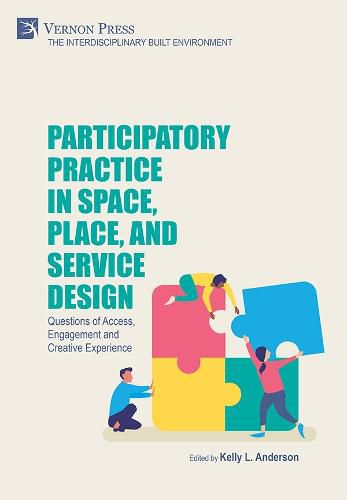Readings Newsletter
Become a Readings Member to make your shopping experience even easier.
Sign in or sign up for free!
You’re not far away from qualifying for FREE standard shipping within Australia
You’ve qualified for FREE standard shipping within Australia
The cart is loading…






This title is printed to order. This book may have been self-published. If so, we cannot guarantee the quality of the content. In the main most books will have gone through the editing process however some may not. We therefore suggest that you be aware of this before ordering this book. If in doubt check either the author or publisher’s details as we are unable to accept any returns unless they are faulty. Please contact us if you have any questions.
'Participatory Practice in Space, Place, and Service Design' is premised on a belief in the importance of participatory practices in finding creative solutions to the plethora of problems we face today. It argues that engaging professions with the public in mutual exploration, analysis, and creative thinking is essential. It not only ensures better quality products, places, services, and a greater sense of civic agency but also facilitates fuller access to them and the life opportunities they can unleash.
This book offers a uniquely varied perspective of the myriad ways in which participatory practices operate across disciplines and how they impact the worlds and communities we create and inhabit. This book suggests that participatory practices are multi-disciplinary and relevant in fields as diverse as design, architecture, education, health care, sustainability, and community activism, to name a few of those discussed here.
How do designed objects and environments affect wellness, creativity, learning, and a sense of belonging? How do products and services affect everyday experience and attitudes towards issues such as sustainability? How does giving people a creative voice in their own education, services, and built environments open up their potential and strengthen identity and civic agency? Addressing these questions requires a rethinking of relations between people, objects, and environments; it demands attention to space, place, and services.
$9.00 standard shipping within Australia
FREE standard shipping within Australia for orders over $100.00
Express & International shipping calculated at checkout
This title is printed to order. This book may have been self-published. If so, we cannot guarantee the quality of the content. In the main most books will have gone through the editing process however some may not. We therefore suggest that you be aware of this before ordering this book. If in doubt check either the author or publisher’s details as we are unable to accept any returns unless they are faulty. Please contact us if you have any questions.
'Participatory Practice in Space, Place, and Service Design' is premised on a belief in the importance of participatory practices in finding creative solutions to the plethora of problems we face today. It argues that engaging professions with the public in mutual exploration, analysis, and creative thinking is essential. It not only ensures better quality products, places, services, and a greater sense of civic agency but also facilitates fuller access to them and the life opportunities they can unleash.
This book offers a uniquely varied perspective of the myriad ways in which participatory practices operate across disciplines and how they impact the worlds and communities we create and inhabit. This book suggests that participatory practices are multi-disciplinary and relevant in fields as diverse as design, architecture, education, health care, sustainability, and community activism, to name a few of those discussed here.
How do designed objects and environments affect wellness, creativity, learning, and a sense of belonging? How do products and services affect everyday experience and attitudes towards issues such as sustainability? How does giving people a creative voice in their own education, services, and built environments open up their potential and strengthen identity and civic agency? Addressing these questions requires a rethinking of relations between people, objects, and environments; it demands attention to space, place, and services.